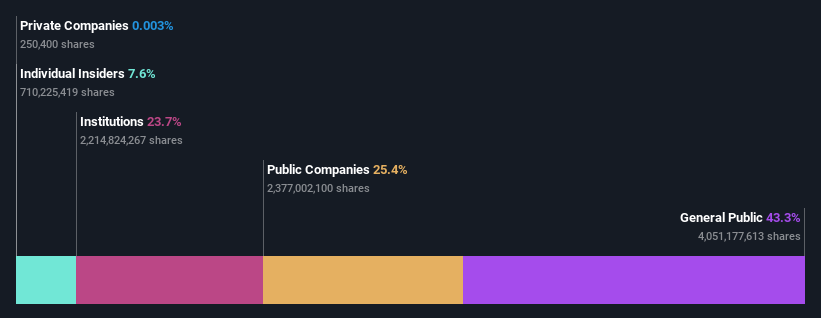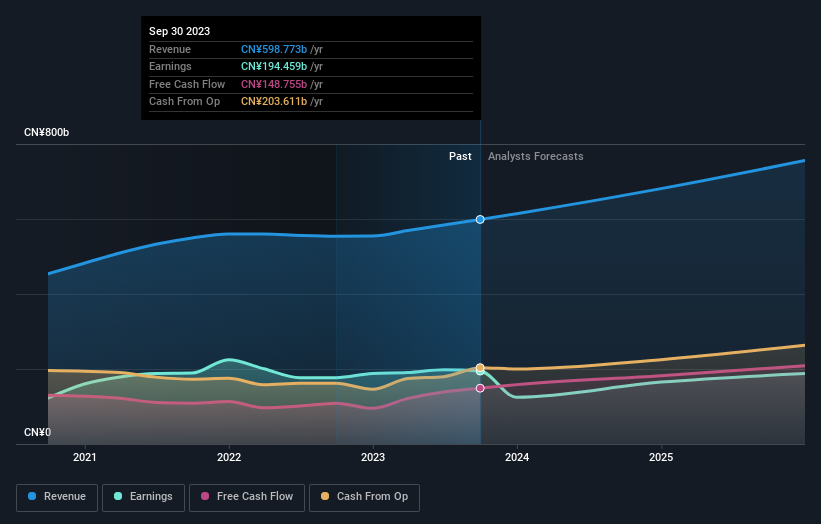- Hong Kong
- /
- Interactive Media and Services
- /
- SEHK:700
While public companies own 25% of Tencent Holdings Limited (HKG:700), individual investors are its largest shareholders with 43% ownership

Key Insights
- Significant control over Tencent Holdings by individual investors implies that the general public has more power to influence management and governance-related decisions
- The top 25 shareholders own 48% of the company
- Recent sales by insiders
To get a sense of who is truly in control of Tencent Holdings Limited (HKG:700), it is important to understand the ownership structure of the business. With 43% stake, individual investors possess the maximum shares in the company. That is, the group stands to benefit the most if the stock rises (or lose the most if there is a downturn).
Public companies, on the other hand, account for 25% of the company's stockholders.
Let's take a closer look to see what the different types of shareholders can tell us about Tencent Holdings.
Check out our latest analysis for Tencent Holdings

What Does The Institutional Ownership Tell Us About Tencent Holdings?
Institutional investors commonly compare their own returns to the returns of a commonly followed index. So they generally do consider buying larger companies that are included in the relevant benchmark index.
As you can see, institutional investors have a fair amount of stake in Tencent Holdings. This can indicate that the company has a certain degree of credibility in the investment community. However, it is best to be wary of relying on the supposed validation that comes with institutional investors. They too, get it wrong sometimes. If multiple institutions change their view on a stock at the same time, you could see the share price drop fast. It's therefore worth looking at Tencent Holdings' earnings history below. Of course, the future is what really matters.

Tencent Holdings is not owned by hedge funds. Looking at our data, we can see that the largest shareholder is Naspers Limited with 25% of shares outstanding. Meanwhile, the second and third largest shareholders, hold 7.6% and 2.7%, of the shares outstanding, respectively. Huateng Ma, who is the second-largest shareholder, also happens to hold the title of Chief Executive Officer.
Our studies suggest that the top 25 shareholders collectively control less than half of the company's shares, meaning that the company's shares are widely disseminated and there is no dominant shareholder.
While studying institutional ownership for a company can add value to your research, it is also a good practice to research analyst recommendations to get a deeper understand of a stock's expected performance. There are plenty of analysts covering the stock, so it might be worth seeing what they are forecasting, too.
Insider Ownership Of Tencent Holdings
The definition of company insiders can be subjective and does vary between jurisdictions. Our data reflects individual insiders, capturing board members at the very least. Management ultimately answers to the board. However, it is not uncommon for managers to be executive board members, especially if they are a founder or the CEO.
Insider ownership is positive when it signals leadership are thinking like the true owners of the company. However, high insider ownership can also give immense power to a small group within the company. This can be negative in some circumstances.
Shareholders would probably be interested to learn that insiders own shares in Tencent Holdings Limited. It is a very large company, and board members collectively own HK$223b worth of shares (at current prices). Most would say this shows a good alignment of interests between shareholders and the board. Still, it might be worth checking if those insiders have been selling.
General Public Ownership
With a 43% ownership, the general public, mostly comprising of individual investors, have some degree of sway over Tencent Holdings. This size of ownership, while considerable, may not be enough to change company policy if the decision is not in sync with other large shareholders.
Public Company Ownership
We can see that public companies hold 25% of the Tencent Holdings shares on issue. We can't be certain but it is quite possible this is a strategic stake. The businesses may be similar, or work together.
Next Steps:
While it is well worth considering the different groups that own a company, there are other factors that are even more important. To that end, you should be aware of the 1 warning sign we've spotted with Tencent Holdings .
Ultimately the future is most important. You can access this free report on analyst forecasts for the company.
NB: Figures in this article are calculated using data from the last twelve months, which refer to the 12-month period ending on the last date of the month the financial statement is dated. This may not be consistent with full year annual report figures.
Valuation is complex, but we're here to simplify it.
Discover if Tencent Holdings might be undervalued or overvalued with our detailed analysis, featuring fair value estimates, potential risks, dividends, insider trades, and its financial condition.
Access Free AnalysisHave feedback on this article? Concerned about the content? Get in touch with us directly. Alternatively, email editorial-team (at) simplywallst.com.
This article by Simply Wall St is general in nature. We provide commentary based on historical data and analyst forecasts only using an unbiased methodology and our articles are not intended to be financial advice. It does not constitute a recommendation to buy or sell any stock, and does not take account of your objectives, or your financial situation. We aim to bring you long-term focused analysis driven by fundamental data. Note that our analysis may not factor in the latest price-sensitive company announcements or qualitative material. Simply Wall St has no position in any stocks mentioned.
About SEHK:700
Tencent Holdings
An investment holding company, offers value-added services (VAS), online advertising, fintech, and business services in the People’s Republic of China and internationally.
Flawless balance sheet and undervalued.

